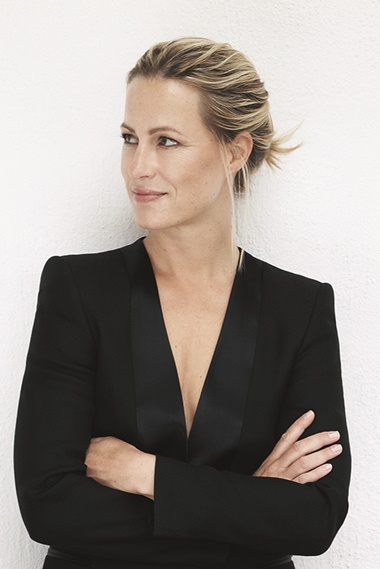
Filippa Knutsson, Filippa K
Sustainability has always been part of the DNA at contemporary brand Filippa K, which was launched in 1993. Part of its point of difference, says founder Filippa Knutsson, is its Scandinavian appreciation of the natural world.
“[Sustainability] starts with a genuine desire to make a difference simply because it’s the right thing to do,” she says. “The fact that we’re Scandinavian helps move the culture forwards at a quick pace. Being aware of how we impact on the environment is embedded in us – it’s a deep connection with the natural world that starts at a young age.”
In the past decade, however, the ethical approach of the business has deepened – and since 2010 in particular, its environmental efforts have expanded, spearheaded by supply chain director Elin Larsson, who stepped up as sustainability director.
“We’ve always wanted to make clothes that last a long time, both in quality and style,” says Larsson. “Sustainability has always been part of our culture, but in 2010, we decided we needed one person to be in charge, to make sure it became an integrated part of everyone’s job.”
Transforming to a circular model means staying up to date and collaborating across the whole value chain
Elin Larsson, Filippa K
She began by defining a “holistic” sustainability strategy, developing five key commitments for Filippa K to achieve by 2030 (box, below). In addition, an internal framework was designed to facilitate a more circular business model centred around four Rs: reduce, repair, re-use and recycle.
This is manifest throughout the organisation. The design team, for example, must produce growing proportions of each collection produced from sustainable materials. In logistics, reusable packaging from RePack is used to send online orders to customers, and every customer who sends their plastic envelope back gets 10% off their next order.
In 2015, the brand launched its own rental offer, leasing clothes to customers through 11 of its stores and charging 20% of the retail price for four days of use. Items ranging from basic tops to cashmere-blend coats retail at between €40 and €1,800 (£35.38 and £1,592). Rental represents a small percentage of total sales, says Larsson, but grew 123% in 2017.
The brand has six UK stockists, including Harvey Nichols and Our Daily Edit.
In Stockholm, Filippa K also has an own-brand second-hand store, as well as a pre-owned section online. It encourages shoppers to recycle their old Filippa K clothes by offering a 15% discount to those who do.
Being aware of how we impact on the environment is embedded in Scandinavians
Filippa Knutsson, Filippa K
The brand has offered a repair service since 2014 and launched “Our Care” guidance on how to prolong the life of garments in 2015. Plans are in place to explore the extension of these services into more markets, including online, says Larsson.
The future, she adds, is about continuing and extending the work Filippa K has already done. This year will involve a focus on improving the dyeing process, which consumes large volumes of water and produces toxic chemicals. The brand is collaborating with sustainable-dyeing company Colorifix, which uses no chemicals.
“Transforming to a circular model is what we focus on,” explains Larsson. “To be able to do that means staying up to date and collaborating across the whole value chain, including with new partners from other industries.”
Despite the good progress already made, Knutsson is not resting on her laurels: “Even if I’m very proud of the focused and diligent work we’ve done and are still doing daily, we can never lean back and say ‘we’re satisfied’.”
Filippa K’s five commitments for 2030
1 During the design phase, the business is aiming to only work with sustainable materials and components for all of its products, and all styles should be recyclable.
2 Products will be produced in a sustainable way, with traceability and transparency evident throughout the supply chain.
3 The business will become resource-efficient, meaning it will produce only what is needed and purchase the right amount of material to do so.
4 All people working with Filippa K products should have good and fair working conditions.
5 Long-term success will be ensured by building long-term relationships and having profit to invest in the organic growth of the company.
Filippa K by numbers
Founded 1993
Markets 30
Stores 50
Wholesale stockists Six in the UK
Concessions 600
Employees 350

